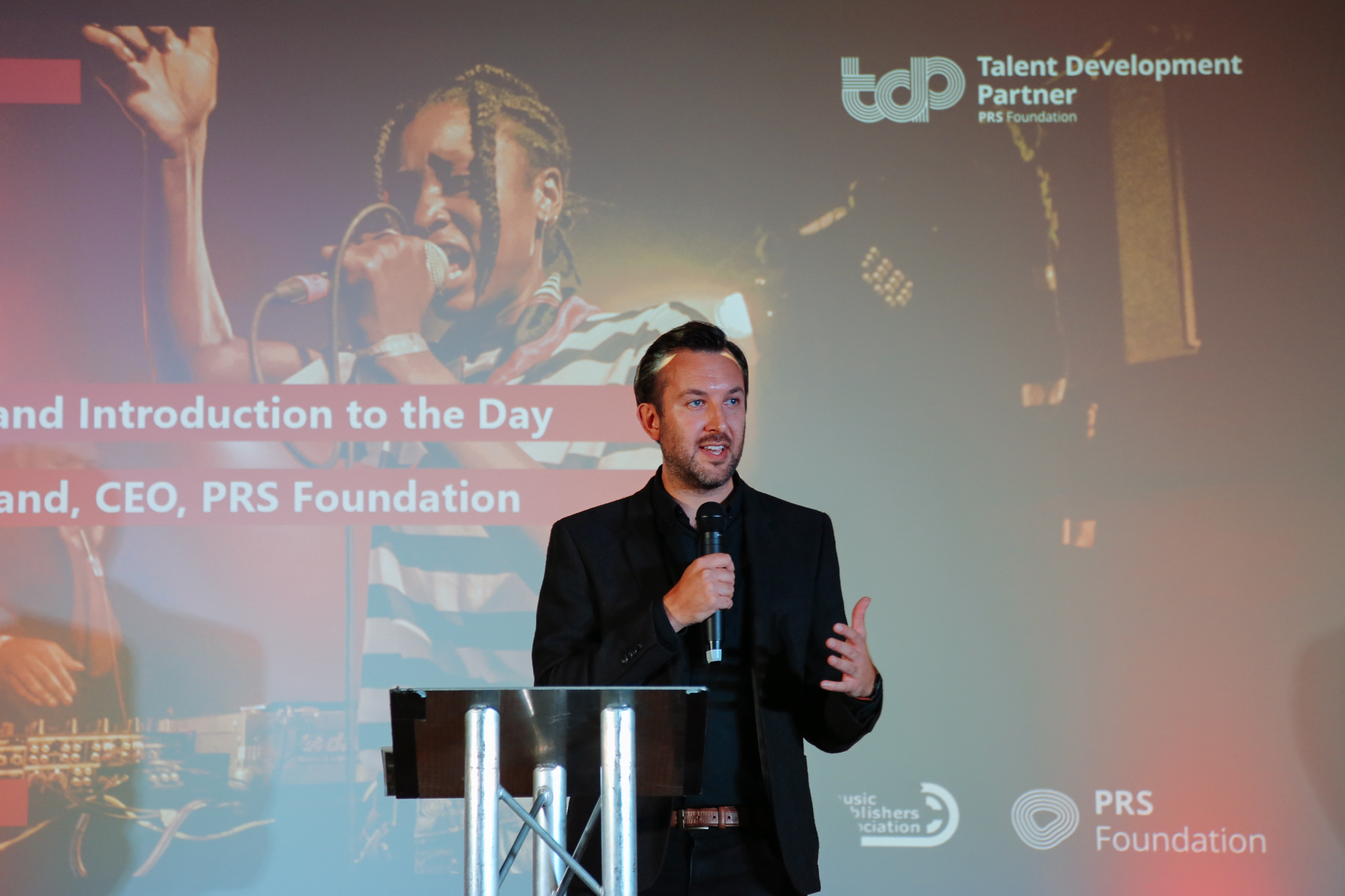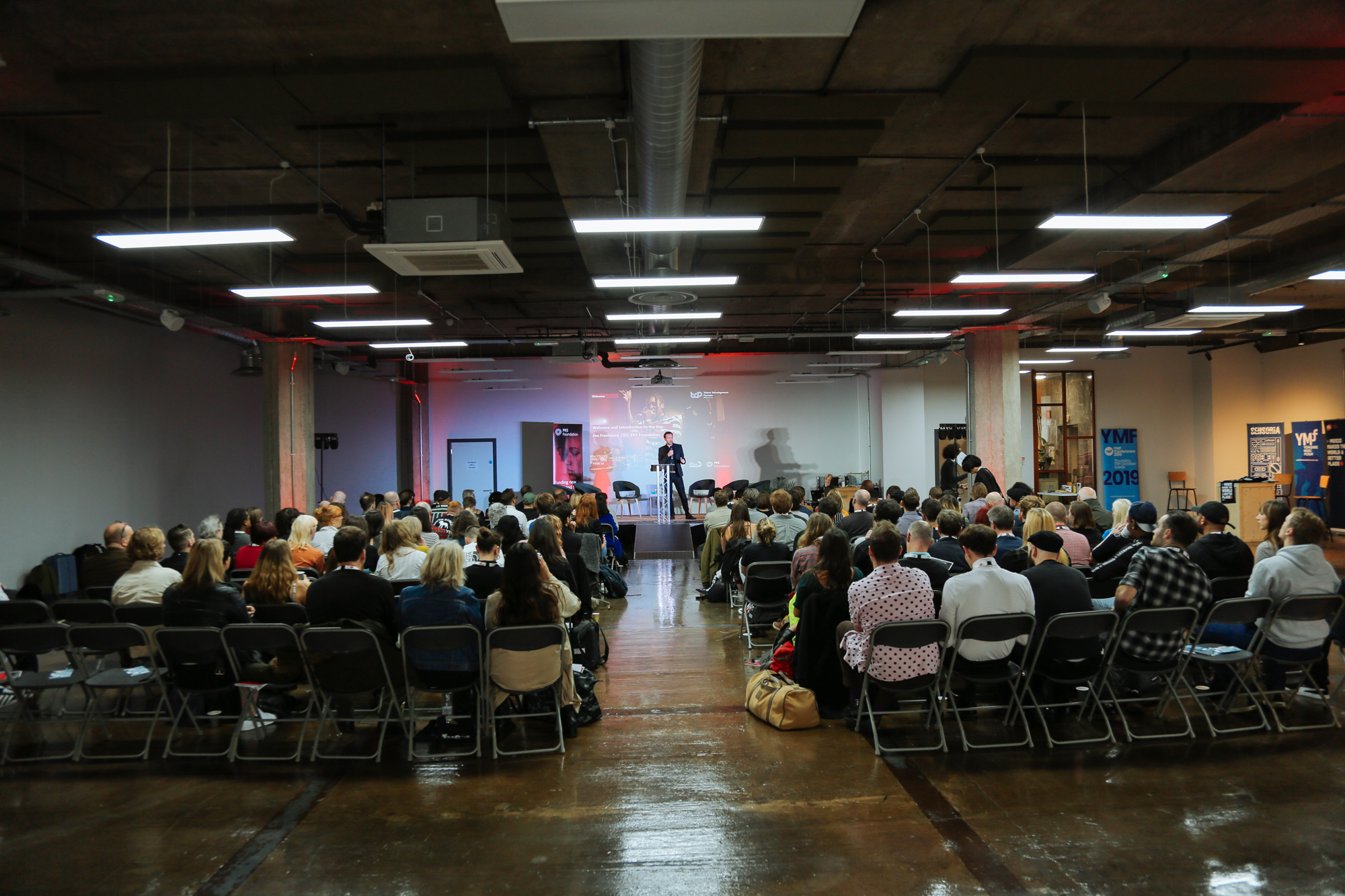Talent Development Conference 2019 – Key Takeaways
Joe Frankland, PRS Foundation CEO
This month, we hosted our annual Talent Development Conference, a landmark day of panels, speeches and networking opportunities, presented with contributions from our network of Talent Development Partners who also took part in a separate Workshop Day, sharing best practice and forging new strategic partnerships for 2020 and beyond.
This year’s conference took place at the impressive new Kollider building in Sheffield and brought together organisations, policy makers, music creators and talent development pioneers working across the UK, covering all genres and career levels.
We covered a range of pertinent topics and below are my key takeaways following a packed two days of shared discussion.
For more information on our Talent Development Partners see this year’s TDP Brochure
Please click here for more photos from the day.
And if you were in attendance, please complete this survey and take part in the conversation on socials using @PRSFoundation and #TDC19.

A CERTAIN ROMANCE – Talent Development in South Yorkshire
With this year’s conference taking place in Sheffield, we were keen to explore talent development provision and gaps in South Yorkshire. We heard from keynote speakers Caroline Norbury (CEO, Creative England) and Laura Bennett (Chair of the newly formed Sheffield City Region Music Board) about the impact of local and national music industry figures coming together with policy makers, councillors and others to build on the region’s great musical heritage. I look forward to the launch of the Music Board’s report from UK Music which no doubt highlights the need to nurture talent and address pipeline gaps by coming together.

Gaps highlighted in our related panel included the need to protect grassroots venues like The Leadmill (our venue of choice the night before), the uncomfortable gap between small and large venues for talent to thrive in, ensuring we reach every corner of the region and all types of music creators, and a need to engage more with the London-dominated music industry.
What shone through for me was how great a base South Yorkshire is for creative development. Considering our main conference theme, it was apt to hear about the region’s collaborative and innovative approach, and South Yorkshire is awash with great venues, affordable studios and rehearsal spaces, and passionate people, making it an inspiring place for songwriters and composers.
As Bat For Lashes and Fat White Family manager, Sarah Brooksbank said,
“There’s a really good underground incubator. And it’s a really good place for eccentric ideas.”
If you must compromise and link more with good people in London, South Yorkshire is the ideal location to create from. That’s what appeals to Rebecca Taylor (aka SELF ESTEEM) and countless other PRS Foundation grantees such as grime artist Coco or Doncaster’s Skinny Pelembe and Bang Bang Romeo.

WITH A LITTLE HELP FROM MY FRIENDS – Meaningful Creative Development
One thing our Talent Development Partners do best is striking the right balance between creative and career development. It’s now easy to record and release music but even easier to get lost. Practical advice on forging careers is still much needed. But what’s the point if the music being created is mediocre? And shouldn’t we be doing all we can to provide songwriters and composers with the time, space, resources and opportunities they need to thrive artistically?
We believe the organisations we fund should specialise in offering meaningful creative development to enable music creators to fulfil their potential. So we wanted to explore great models on offer– from residencies to writing camps, from commissions to collaborations.

Rakhi Singh’s collaborative residency at Snape Maltings and DJ Nik Nak’s Brighter Sound, Generator and Sage Gateshead residencies – which bring in experts to support residents – offered deeper engagement and the time, space and low-pressured environment needed to inspire great work. On the more commercial and Pop side, Yaw Owusu spoke of sending an artist on writing trips to Hanover to grow and connect. And Drake Music Scotland’s bespoke support for composer Ben Lunn adapts to his needs so he can create outstanding new music and experiment with new and accessible technologies.
Juggling creative and career development is stressful for any creator and while there is no quick fix, it’s important that team members, the industry and non-profit organisations alleviate pressure and allow songwriters and composers to focus on creation. As a funder, I am inspired to ensure that more music creator and organisation applicants come to us to prioritise creative development.

OPEN UP YOUR DOOR – Inclusivity and collaboration
I’ve attended my fair share of conferences over the years and it’s great to see Diversity becoming more integrated within programmes – moving away from male, pale and stale speaker bookings towards reflecting the diversity of new music. A great example this year was Reeperbahn Festival – our Keychange Partners – who integrated the theme of gender equality within their whole programme in a genuine and inspiring way.
We adopted a similar approach for the Talent Development Conference, giving a platform to a broad range of creators and industry professionals in every session while highlighting two areas of inclusivity we feel the sector – ourselves included – need to improve on: Gender Identity and Accessibility.
Having proactively worked towards gender parity for several years, we’ve been talking a lot in 2019 about being more inclusive of the gender spectrum as a whole. An inspiring panel discussion between BBC 6Music’s Clare Crane and two LGBTQ+ artist champions, Queen Zee’s Zena Davine and CHAINES highlighted the importance of talking about, championing and being inclusive of gender minorities. We’ll certainly be taking on board simple, actionable advice from CHAINES, including:
- not being afraid to ask awkward questions
- follow people from minority groups on social media to hear different perspectives
- adapt language to break down barriers (“’gender minority’ is more inclusive than ‘non-binary’”)

Being more open was a common theme during our conference and we were pleased, through one of our ‘Hi-Five’ sessions, to champion the great work of Attitude is Everything, whose recent Next Stage artist survey offers sobering stats about the barriers facing artists with access requirements. 46% are disabled by physical barriers at most gigs that they play and 2 in 3 have had to compromise their health or wellbeing to perform live. Accessibility is not just an issue in the live sector though, with studios and rehearsal spaces also needing to be more inclusive. And we’ve been working very closely with Attitude is Everything and fellow funders and talent development experts to address the fact that development opportunities are not as accessible as they need to be. A new Steering Group is tackling these issues and we look forward to announcing some significant changes in 2020, using the conference and workshop to ensure that our collective Open Call programmes are truly that – open to all.
“Accessibility hinders no one, it only enriches our industry and community” Rich Legate, Attitude is Everything
An openness to collaboration was also highlighted in the programme.
Artist and songwriter Shirley Tetteh (aka Nardeydey) might fairly be described as a serial-collaborator, working in several critically acclaimed jazz bands and on various other projects. Having genuine human connection with collaborators is key for Shirley, as was clarity of her role going into a new collaboration.
This is something that came up later in the day with our bonus BBC Music Introducing, PRS for Music and Yorkshire Music Forum Songwriting Masterclass. As the number of songwriters involved in the average hit single increases, it was refreshing to hear guest songwriters Jake Gosling, SELF ESTEEM, Emma Stakes and Marshall Music agreeing that it’s all about putting the artist and collaborator at the centre, collaborating genuinely and on a human level to produce authentic songs.
“The artist always comes first. They’re the ones living it and then touring the music, not the labels or management.” Jake Gosling
Successful collaboration between music creators and between organisations relies on clear terms of engagement from the outset. And the linkups work best when each party brings something fresh to the table. We highlighted great examples of Talent Development Partners working together to upstream music creators or to reach creators and audiences they couldn’t reach alone.
And as those in power attempt to impose more barriers and harder borders on us, it is more important than ever that UK-based organisations, creators, funders and industry bodies encourage international collaboration. 40% of PRS Foundation’s grants support international activities, and we are proud to work with the likes of British Underground and British Council who support genuine cultural exchange and offer life-changing support globally. British-Iranian composer and sound artist, Soosan Lolavar particularly inspired delegates to think globally, advocating for exploring new and genuine ways to authentically and sensitively collaborate overseas and with those in the UK from other cultures.

THE TIME IS NOW
While creative development was the overarching theme for the conference, bigger themes of inclusivity and coming together to change the world were the far more important takeaways.
For me, the day affirmed that the music industry is best positioned to get together, break down barriers and apply innovative solutions to global issues.
The renewed sense of urgency around inclusivity – taken from Attitude is Everything’s ‘Hi-Five’ on accessibility, from Maxie Gedge’s Keychange ‘Hi-Five’, and from our gender inclusivity panel – shows that it’s our responsibility to make small changes which will have a massive impact. Giving a platform to creators from all backgrounds and offering them much more meaningful support will be key. Those creators and the innovators working to support them will in turn create, perform and release music that has a greater impact socially, culturally and economically.
While speakers didn’t shy away from politics, the focus was on what we can do individually and as a music industry to enact change and create a better future.
A most inspiring ‘Hi-Five’ from Savages drummer and 180dB producer, Fay Milton highlighted the vital work of Music Declares Emergency – a group of artists, music industry professionals and organisations that stand together to declare a climate and ecological emergency. Music Declares call for an immediate governmental response and Fay described the unique position the music industry is in to inspire and implement change in this ecological emergency.
“Taking action on climate change is not something that we should be doing, it’s something we must be doing.” Kevin Le Gendre
What are you waiting for?!
- Sign up to Music Declares Emergency here: https://www.musicdeclares.net/
- Organisations can sign the Keychange 50:50 Pledge, and music creators and innovators can apply for Keychange support here: http://keychange.eu/
- Find out more about Attitude is Everything, the Next Stage Survey and their Charter here: http://www.attitudeiseverything.org.uk/

Find out more about our Talent Development Partners

